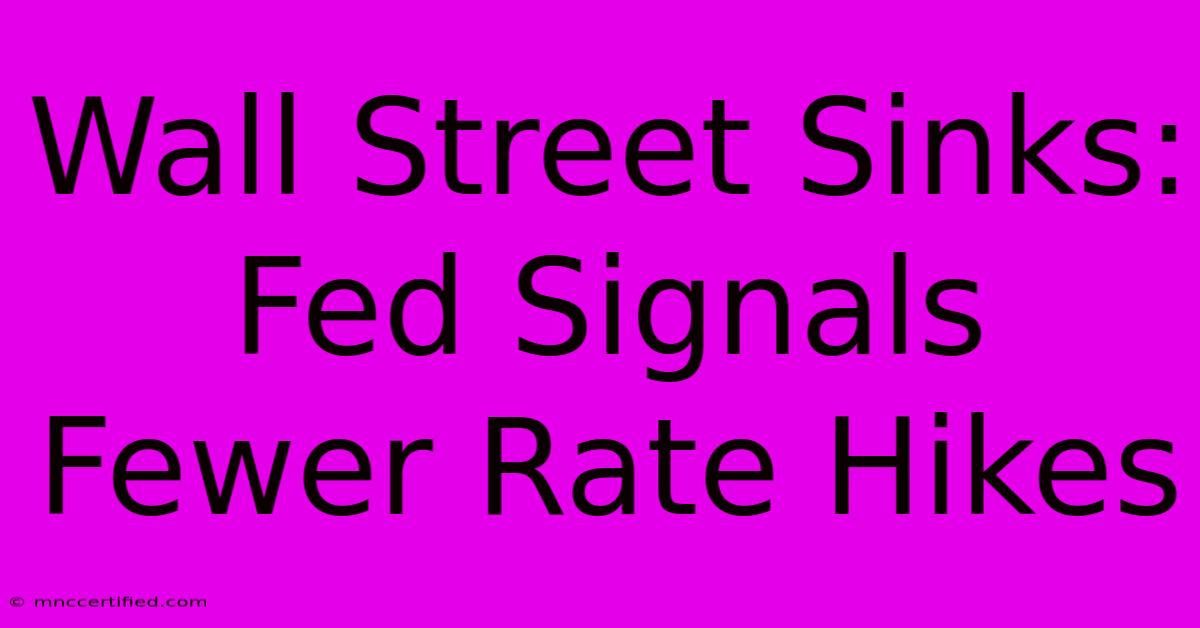Wall Street Sinks: Fed Signals Fewer Rate Hikes

Table of Contents
Wall Street Sinks: Fed Signals Fewer Rate Hikes
Wall Street experienced a significant downturn following the Federal Reserve's latest announcement signaling a potential slowdown in interest rate hikes. This unexpected shift in monetary policy sent shockwaves through the market, leaving investors scrambling to understand the implications. This article delves into the reasons behind the market's reaction, analyzing the Fed's decision and its potential long-term consequences for the economy.
The Fed's Pivot: A Shift in Monetary Policy
The Federal Reserve's decision to hint at fewer interest rate increases than previously anticipated marks a notable pivot in its monetary policy. For months, the Fed aggressively raised interest rates to combat persistent inflation. This strategy, while aiming to cool down the overheating economy, also risked triggering a recession. The recent shift suggests the Fed is now acknowledging the potential negative impact of its aggressive approach and is prioritizing a more balanced strategy. This recalibration reflects a growing awareness of the economic slowdown already underway, and a recognition that further aggressive rate hikes could exacerbate the situation.
What Drove the Fed's Decision?
Several factors contributed to the Fed's decision to potentially slow down rate hikes:
-
Weakening Economic Data: Recent economic indicators, including slower-than-expected job growth and declining consumer spending, suggest a cooling economy. These data points raised concerns about the possibility of a deeper economic contraction if the Fed continued its aggressive rate hike trajectory.
-
Inflation Showing Signs of Cooling: While still elevated, inflation has shown signs of cooling in recent months, albeit slowly. This gives the Fed some leeway to moderate its rate hike approach, allowing time to assess the full impact of past increases.
-
Growing Recessionary Fears: The prospect of a recession looms large, prompting the Fed to exercise caution. A more aggressive approach to rate hikes could inadvertently push the economy into a deeper recession, causing significant harm to employment and economic growth.
Market Reaction: The Impact on Wall Street
The Fed's announcement immediately triggered a sell-off on Wall Street. The market's negative reaction, while seemingly counterintuitive given the less aggressive stance, stemmed from several factors:
-
Uncertainty about the Future: Investors are wary of uncertainty. While fewer rate hikes are generally positive, the ambiguity surrounding the Fed's future actions creates volatility. The market dislikes uncertainty and reacts negatively to it.
-
Profitability Concerns: Higher interest rates increase borrowing costs for businesses, potentially impacting profitability and slowing economic growth. Although fewer hikes are positive, the already existing higher rates pose a challenge for company profits.
-
Inflation Still a Concern: Although inflation is cooling, it remains a significant concern. The market's reaction suggests that investors are worried that the Fed's less aggressive approach might not be enough to bring inflation down to the desired level, leading to continued economic uncertainty.
Long-Term Implications: Navigating Economic Uncertainty
The long-term implications of the Fed's decision remain uncertain. While fewer rate hikes could prevent a severe recession, they also risk allowing inflation to remain stubbornly high. The delicate balance the Fed must strike is crucial for the health of the economy. Investors must closely monitor future economic data and the Fed's subsequent announcements to navigate this period of uncertainty.
What to Watch For:
-
Inflation Data: Future inflation reports will be crucial in shaping the Fed's future monetary policy decisions. A persistent rise in inflation could force the Fed to resume its aggressive rate hike approach.
-
Job Market Data: The strength of the job market will also play a significant role. A weakening job market could signal a deeper economic slowdown, potentially prompting the Fed to take a more cautious approach.
-
Economic Growth: Overall economic growth figures will provide vital insight into the health of the economy and the effectiveness of the Fed's monetary policy.
Conclusion: The Fed's signaling of fewer rate hikes has created a complex situation for Wall Street and the broader economy. While a less aggressive approach might mitigate the risk of a severe recession, it also introduces uncertainty and the risk of persistent inflation. Navigating this period requires careful monitoring of key economic indicators and a nuanced understanding of the Fed's evolving monetary policy. The coming months will be critical in determining the long-term consequences of this pivotal decision.

Thank you for visiting our website wich cover about Wall Street Sinks: Fed Signals Fewer Rate Hikes. We hope the information provided has been useful to you. Feel free to contact us if you have any questions or need further assistance. See you next time and dont miss to bookmark.
Featured Posts
-
Endo Leads Liverpool To League Cup Victory
Dec 19, 2024
-
Intercontinental Cup Real Madrid Lineup
Dec 19, 2024
-
New Elton John Christmas Video
Dec 19, 2024
-
Crystal Palace Vs Arsenal League Cup Final Score
Dec 19, 2024
-
Vanuatu Earthquake Australias Support
Dec 19, 2024